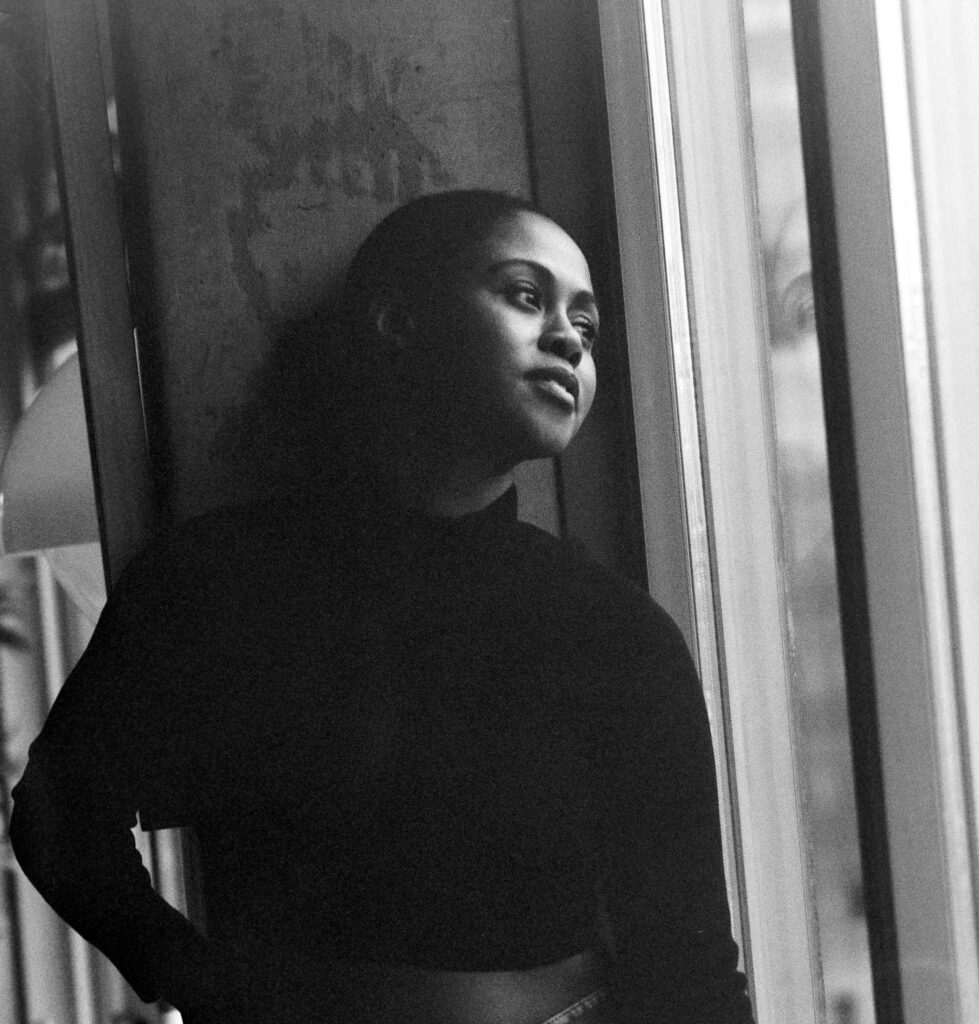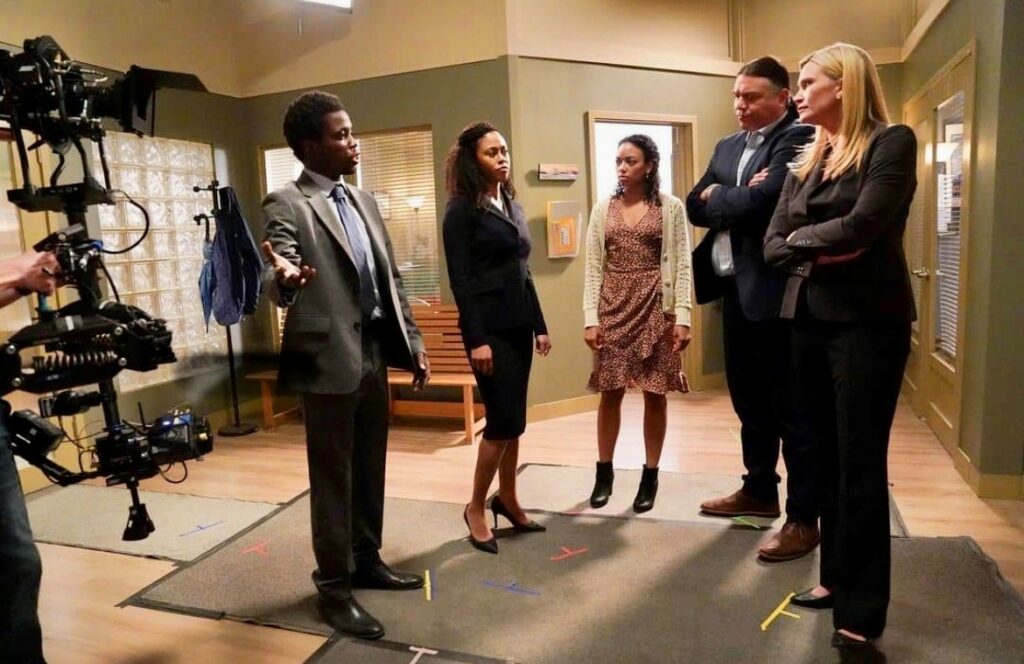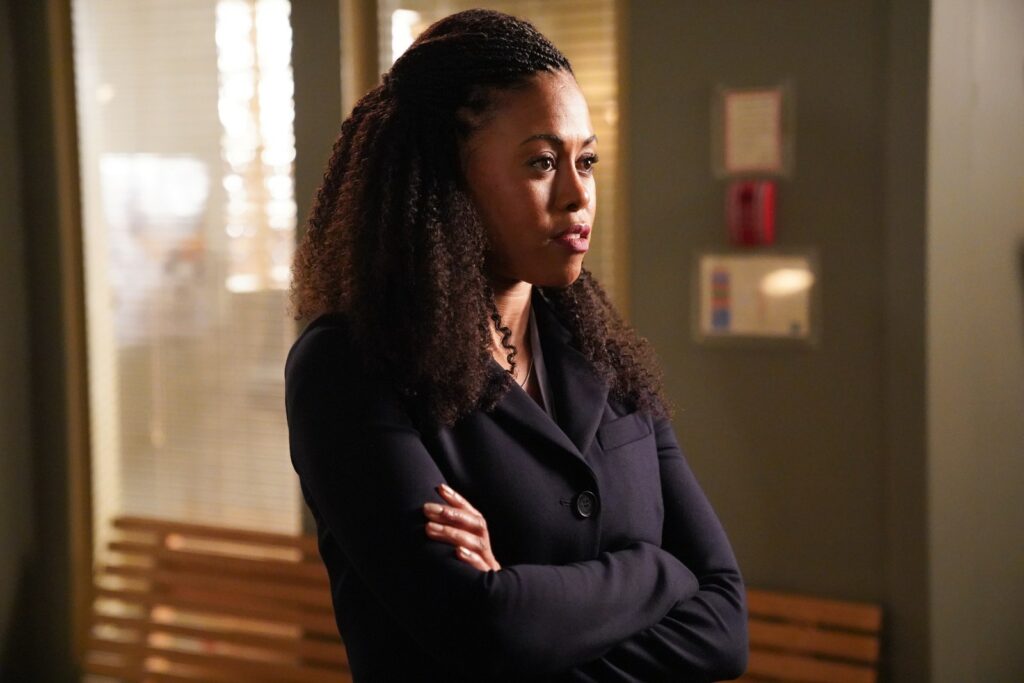
Championing Inclusion on our Film & TV Sets
by Vinessa Antoine
Jully Black and Vinessa Antoine in CBC’s Diggstown season three. Photo courtesy of CBC.

Vinessa Antoine
Photo: SwallowTail Films Inc.
It’s 4:00 a.m. and I’ve just hit the snooze button on my alarm for the last time. Call-time is at 5:00 a.m. and I’ve spent most of the night prepping my hair and my lines. I’m exhausted.
In my trailer, I’ve set up a “makeshift” hair and makeup station loaded with my own personal products and tools. It’s a mess, but with quick and shaky hands I organize the table as best as I can. Coffee, breakfast and water on one side, script and sides on the other, and hair products and makeup down the middle.
As I make my way to the hair trailer, I take a deep breath and say, “God, I hope they know what they’re doing in there.” It only takes a second before I realize they do not. The showcased lineup of hair products and tools is enough for me to know this.
Once again, I’m thankful I started prepping my hair the night before and that my trailer was stocked with my own goods.
I play it cool. I look at my lines hoping to fool the other actors sitting in chairs beside me. They seem so relaxed. Calm. Unbothered. Sauntering in and plopping themselves into chairs with wet hair. Some of them hadn’t even shaved yet, sporting a full beard, uncoloured roots and in need of a haircut.
Once again, I’m thankful I started prepping my hair the night before and that my trailer was stocked with my own goods.
Ah to dream. I thought about how I could not even imagine some of my fellow Black male actors coming to work without going to the barbershop on their own dime the night before. And wet hair? Forget it. The peace. The confidence. The fact that it was free. I envied it.

Would I receive the ol’ fluff fluff pass? The old gentle tap on the shoulder only to be passed on with a smile and a, “You look great with what you’ve done already.”
Here I was exhausted and full of anxiety. Not to mention the cost of buying products and tools, if I was being honest… I really had no business using, I learned on the job. Like most of us do.
What would become of my head of hair on this project? Would I receive the ol’ fluff fluff pass? The old gentle tap on the shoulder only to be passed on with a smile and a, “You look great with what you’ve done already.” In a way, I was secretly counting on it. That way I could get back to my trailer to get myself together so I didn’t look crazy on camera. Maybe if there was time… I’d even get to look at my lines.
There is a small but very obvious dark scar on my forehead. It’s only detectable in certain light and with the right makeup it’s barely noticeable. But I notice it. I see it in the mirror every time I get myself together to start my day. I don’t think too much about it, but I know it’s there. The scar is a small but stark reminder of the anxiety and misfortune of a Black actress attempting to do her own hair in her trailer. Hot tools, early mornings combined with untrained actors pretending to be hairstylists can be a dangerous thing.
Hot tools, early mornings combined with untrained actors pretending to be hairstylists can be a dangerous thing.
My name is Vinessa Antoine and I’m an actress. I’m on a show called Diggstown on the CBC. The one thing I didn’t train for, but I wish I had, was how to do hair for film and television.
Not just hair… afro-textured hair, wigs, weaves, braids and everything in between. I get asked all the time to give advice to young Black people about starting out in the business. I always say, “Learn your craft, know who you are, get a mentor… and learn how to do your own damn hair.”
Over the last 20 years of working as an actor in film and television, I’ve had the honour of creating with some of the most talented people.
But make no mistake about it, from our friends all the way in the U.K., to our U.S. neighbours just south of the boarder, to right here in “multicultural” Canada, we have a major gap to fill in the hair and makeup department.
After spending the last three years working with some really great people, my anxiety and hot curling iron accidents are behind me now. Why? Because I have an amazing Black showrunner and amazing producers from all backgrounds championing for this type of inclusion.
That’s what it’s going to take to make changes in this area of our industry. But make no mistake about it, from our friends all the way in the U.K., to our U.S. neighbours just south of the boarder, to right here in “multicultural” Canada, we have a major gap to fill in the hair and makeup department.
The lack of accredited hair and makeup professionals with a skill for taking care of Black performers has resulted in a situation where Black series regulars have had to learn to style their own hair and/or apply their own makeup. This, in and of itself, creates a double standard in our industry.

It’s time for the unions and production companies to start changing how key hair and makeup departments are hired and how they are accessed.
A hair stylist who has spent their career working in a Black hair salon will likely have a vastly superior knowledge of Black hair than a typical hair stylist on a film set. It’s time for the unions and production companies to start changing how key hair and makeup departments are hired and how they are accessed.
I believe if you are working in the hair and makeup department on a film or television set, you should be able to work on all types of people and be able to prove you are capable of doing so. There is too much education out there and people who are willing to learn for this problem to continue.
After all, if we can’t do it for someone who is number one on the call sheet, then what are we really doing?
Vinessa Antoine made TV history in 2018 as the first Black Canadian woman to lead a prime-time Canadian drama on network television and to be ‘number one’ on the call sheet. She left her role as Jordan Ashford in the American soap opera General Hospital to play Marcie Diggs in the Halifax-shot CBC series Diggstown, currently in its third season. In 2021, Vinessa received a Canadian Screen Award nomination for Best Actress in a Drama Series and won the ACTRA Maritimes Award for Outstanding Performance by an Actor in a Lead or Featured Female Role for her work on Diggstown.
